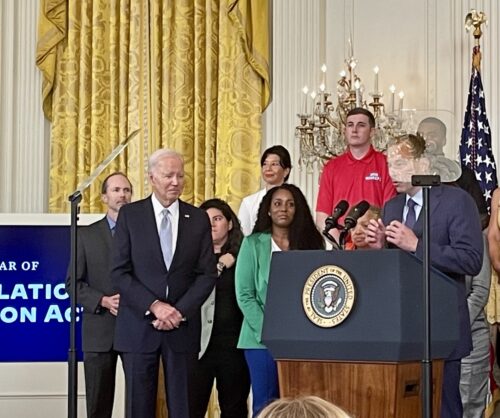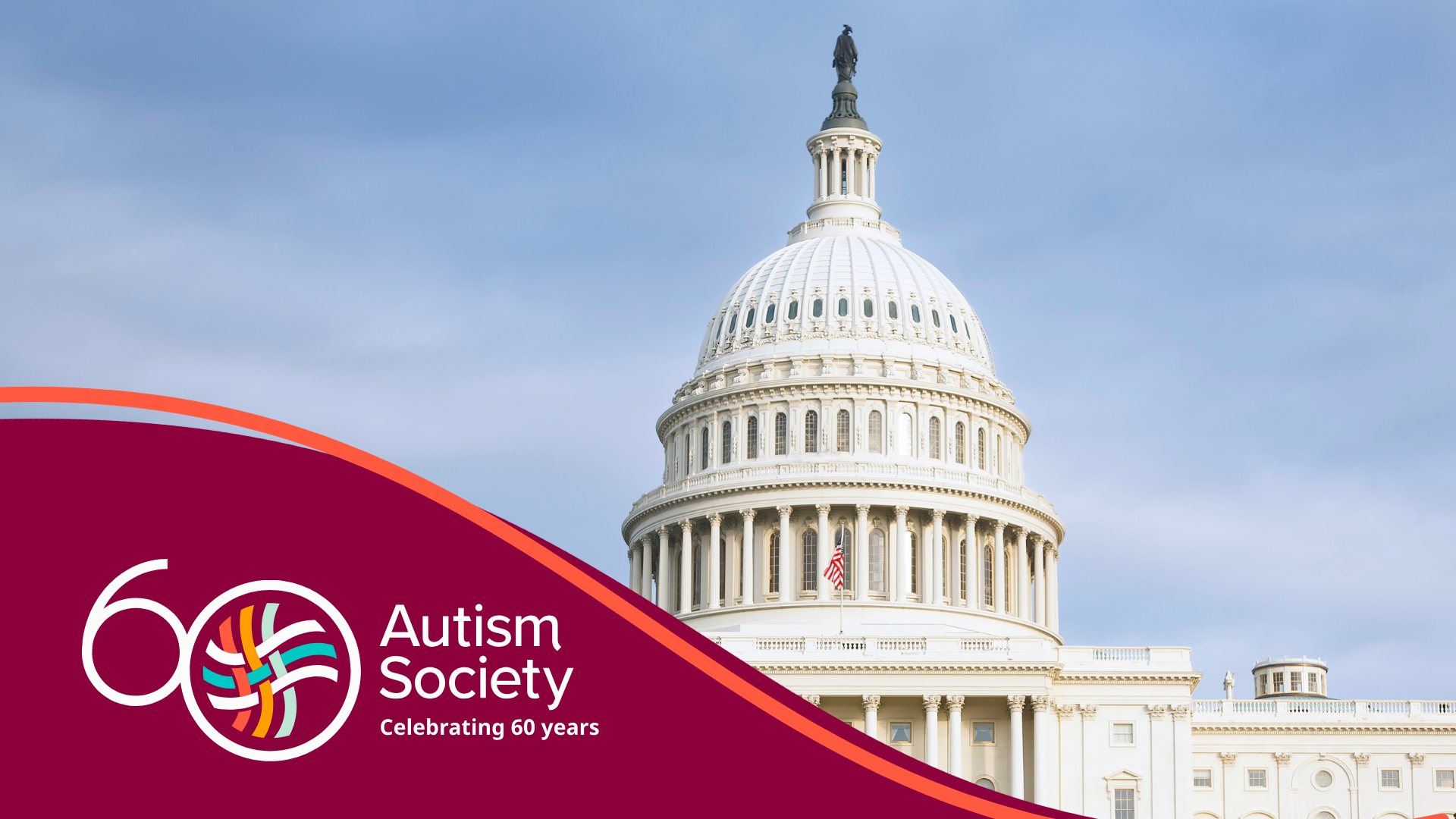
In this issue of Capitol Connection, see a table comparing funding proposals to date, legislation on education and workforce, and federal guidance and resources that can be used to advocate at the state and federal levels. Congress will be working in their home states until the second week of September. We encourage you to use this time to meet them in their home or district offices. Please use the Autism Society’s Action Center to see relevant issues and ideas for talking points.
Legislative Updates
Inflation Reduction Act

The Autism Society participated in a one-year anniversary celebration of the enactment of the Inflation Reduction Act (IRA) on August 16. The IRA lowered premium costs in the Affordable Care Act marketplace and prescription drug costs for seniors using Medicare. Starting in September, Medicare will announce the first 10 drugs that, effective 2026, will have negotiated prices under the drug price negotiation program. In addition, starting October 1, Medicaid and CHIP beneficiaries will have access to recommended vaccinations free of cost. The law also has a number of provisions to address climate change, which disproportionately impacts marginalized communities.
Appropriations
On July 27, the Senate Labor, HHS, Education (L-HHS-ED) Appropriations Subcommittee passed their funding bill that includes increases in crucial areas such as special education and early intervention, teacher training, mental health, early childhood grants, and family caregiver programs. See the chart below comparing last year’s funding to the proposed Senate bill, and read the bill summary prepared by Senate staff. The House L-HHS-ED Appropriations Subcommittee passed a bill on July 13 that includes up to 29 percent cuts in some programs and eliminates 61 programs. Line-by-line details have not yet been released, and the full subcommittee has not announced a date to take action.
The gap between the House and Senate appropriation bills, combined with controversial policy amendments in the House bill, makes it extremely challenging to reach an agreement by the October 1 deadline of the new fiscal year. If they fail to pass the funding bills by October 1, the government could face a shutdown, putting critical services at risk.
The Autism Society created Take Action Alert to educate members of Congress about the need to provide adequate funding for programs that support people with Autism and their families.
| Table Comparing Appropriations for FY 23 to FY 24 for Programs within the L-HHS-ED and DOJ bills (in millions) | ||||
| Final FY23 Enacted | President FY 2024 Request | Senate FY 2024 Request | Difference between FY 23 Final and Senate’s FY 24 Request | |
| Department of Health and Human Services | ||||
| Health Resources and Services Administration (HRSA) | ||||
| Maternal and Child Health Block Grant | 822.0 | 937.0 | 812.0 | -10.0 |
| Autism and other DD (Includes LEND) | 56.0 | 57.0 | 56/0 | 0.0 |
| Centers for Disease Control and Prevention (CDC) | ||||
| Center on Birth Defects and DD (NCBDDD) | 206.0 | 223.0 | 206.5 | +0.5 |
| Injury Prevention and Control | 761.3 | 1,352.0 | 761.8 | +0.5 |
| —Vaccines for Children | 5,609.0 | 6,002.0 | 5,815.0 | +206.0 |
| —Vaccines for Adults | – | 1,004.0 | ||
| HRSA | ||||
| Suicide Prevention | 28.0 | 49.0 | 28.0 | 0.0 |
| 988 Behavioral Health Hotline | 502.0 | 836.0 | 520.0 | +18 |
| National Institutes for Health | ||||
| NICHD | 1,749.0 | 1,749.0 | 1,749.0 | 0.0 |
| NIMH | 2,113.0 | 1,949.0 | 2,213.0 | +100.0 |
| Department of Education | ||||
| IDEA Part B | 14,194.0 | 16,259.0 | 14,369.0 | +175.0 |
| Part C Early Intervention | 540.0 | 932.0 | 560.0 | +20.0 |
| Preschool Grants | 420.0 | 502.5 | 420.0 | 0.0 |
| IDEA Part D programs | ||||
| State Personnel Development | 38.6 | 53.6 | 38.6 | 0.0 |
| Technical Assistance | 45.0 | 55.5 | 39.0 | -6.0 |
| Personnel Preparation | 115.0 | 250.0 | 134.5 | +19.5 |
| Parent Information Centers | 33.0 | 49.0 | 33.0 | 0.0 |
| Education technology | 31.4 | 41.5 | 31.4 | 0.0 |
| Postsecondary Program for ID | 13.8 | 15.0 | 13.8 | 0.0 |
| Supported Employment | 22.5 | 22.5 | 22.5 | 0.0 |
| Department of Justice (not within the Depts of L-HHS-ED) | ||||
| Kevin and Avonte’s Law | 3.0 | 3.0 | 3.0 | 0.0 |
Direct Support Works Bill Passed Committee
The Recognizing the Role of Direct Support Professionals Act (H.R. 2941 / S. 1332) passed unanimously through the Senate Committee on Homeland Security & Governmental Affairs. The bill requires the Office of Management and Budget (OMB) to consider the creation of a standard occupational classification (SOC) for direct support professionals. Next, the bill has to go through the full Senate and then the House for passage. Use our Action Alert to educate your members of Congress on how this bill would help improve wages and working conditions for direct support workers.
IDEA Part C Funding Bill Introduced
The Funding Early Childhood is the Right IDEA Act (H.R. 5141) was re-introduced by Representative Mark DeSaulnier. The bill increases funds for the two early childhood programs within the Individuals with Disabilities Education Act (IDEA). It also authorizes a glide path of increased authorization levels for the IDEA Part C early intervention program and Section 619 of the Part B preschool program. Early intervention is especially important to students with Autism, who benefit significantly from getting services and supports as early as possible.
Administration Updates
Department of Education Guidance on General Supervision
The Office of Special Education Programs (OSEP) under the U.S. Department of Education released updated policy guidance on the general supervision requirement under IDEA, which requires states to monitor local education agencies to ensure schools comply with the rights of students with disabilities. The updated guidance provides states actionable information on how to timely identify and correct noncompliance and reminds states they must ensure consistent implementation of IDEA. It also clarifies that, when non-compliance is identified, states have to review each individual student to make sure the occurrence has been corrected. The guidance stresses due diligence and timelines. To learn more, access the guidance, the Dear Colleague Letter, and a summary put together by National PLACE.
Department of Education New Blog on Transition Planning
The Office of Special Education and Rehabilitation Services (OSERS) released a new blog series to continue emphasizing the need for more cohesive secondary transition planning for students with disabilities. The blog focuses on key statistics and programs the Department of Education has launched to assist with this effort. Earlier this year, OSERS kicked off its Expect, Engage, Empower: Successful Transitions for All! initiative to focus on effective transition planning to help young adults move from school to postsecondary education, community living, or competitive integrated employment.
Proposed Rule on Online Accessibility
The Department of Justice released a new proposed rule in August that aims to improve web and mobile applications access for people with disabilities. It also clarifies how state and local governments can meet their existing Americans with Disabilities Act (ADA) obligations now that many programs and activities have moved online. The Notice of Proposed Rulemaking (NPRM) is online and open for comments until October 3.
New Rule on Airline Bathroom Accessibility
The Department of Transportation released a new rule last month on increasing accessibility to lavatories on aircrafts. The new rule states that lavatories on new single-aisle aircraft must be large enough to permit a passenger with a disability and an attendant. This new rule comes as the Department of Transportation has worked to increase accessibility at airports and public transportation. The Department is also working on a rule to require training for airline staff to support people with disabilities.
Family Support Resources
The Autism Society participated in a National Supporting Families Collaborative Steering Committee meeting this week. During the meeting, two good resources were shared that can be helpful in state advocacy efforts:
- ARPA Inventory, NASDDDS – this document is an analysis of states’ ARPA strategies by topics including using the funds for the direct support profession (DSP) workforce.
- Caring Families Topic Brief – this brief contains information on the practices in place among states for paying relatives to deliver supports and services through HCBS. An estimated 53 million people in the United States supported an adult or child with support needs in 2019. This brief can be helpful in advocating for state options to support families.
Share:




